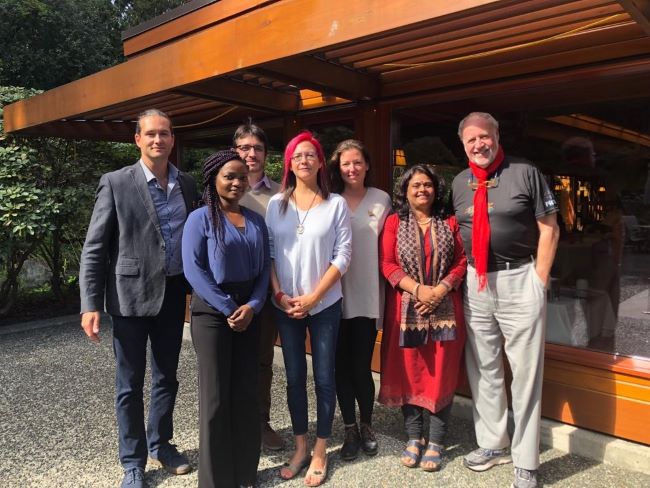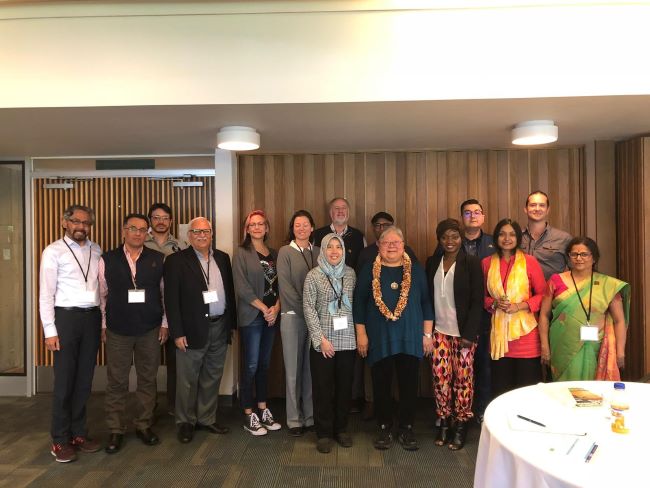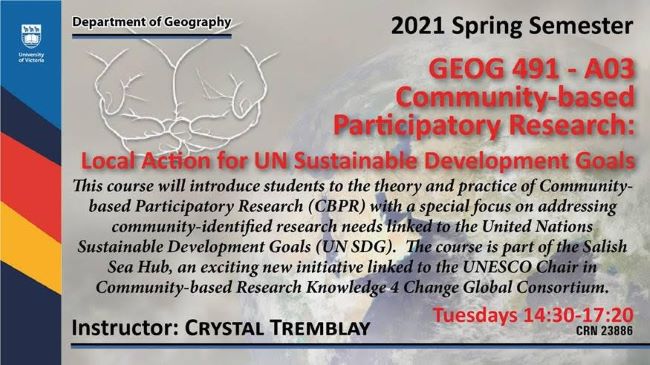Map
LOCATION
Located on the traditional territories of the Coast Salish and Straits Salish Territories of the lək̓ʷəŋən and W̱SÁNEĆ Peoples.
PARTNERS (UNIVERSITY/COMMUNITY PARTNER ORGANISATION)
- University of Victoria (Faculty of Social Sciences and the Office of the Vice President Research) https://www.uvic.ca
- Victoria Native Friendship Centre (VNFC) https://www.vnfc.ca
- Victoria Foundation https://victoriafoundation.bc.ca
DESCRIPTION
PHILOSOPHY
The Salish Sea is the intricate network of coastal waterways that includes those surrounding Vancouver Island and the southwestern portion of mainland British Columbia (BC). This term was selected for the name of the Hub not just to reflect the geographic desire to focus supports in this area of the province, but also as a reflection of the intricate ways we hope the Hub will extend into communities.
The Salish Sea Hub is a Community Based Participatory Research (CBPR) hub, grounded in Indigenous ways of viewing the world, and focused on bringing research out of academia and into communities. Our relationships are guided by respect, reciprocity and responsibility to each other and our goals – each of us bringing unique strengths, perspectives, and gifts to our work. This is accomplished by creating connections, encouraging new partnerships, supporting development work, and providing community-based and Indigenous-led research training and mentorship. The Hub is focused on empowering marginalized communities through CBPR, including Indigenous peoples, youth, Elders/seniors, 2SLGBTQ+, new Canadians and refugees, street entrenched, etc. These groups have historically been excluded from research, or used as research subjects, as opposed to being leaders in research. We want to shift power dynamics so communities are in charge of the research process and outcomes. We build capacity in communities and the university to be active in mutually reciprocal research partnerships and knowledge co-creation.
GOALS
- To deliver innovative and experiential CBPR training and research that respond to and create action for addressing the United Nations Sustainable Development Goals and Declaration on the Rights of Indigenous Peoples that relate to identified issues and priorities of our community partners.
- To create/expand an academic-practitioner learning environment and long-lasting relationships with, and impacts in, local communities.
- To serve our local communities by providing research training and capacity development that is locally relevant and applicable.
GUIDING PRINCIPLES
ACKNOWLEDGE, RESPECT and LEARN from Indigenous ways of knowing and the people on whose lands and waters collaborations will take place;
COLLABORATION in development of innovative community-driven research and learning;
COMMITMENT to excellence in CBPR process;
HUMILITY and openness to understanding others, being both the learner and the teacher;
INTEGRITY and HONESTY in matters related to all areas of collaboration;
RESPECT for different ways of knowing and being;
WISDOM in having patience and presence in the space of evolving and infinite knowledge;
Principles of community Ownership, Control, Access and Possession (OCAP) guide all Hub activities.
MENTORS
Our Mentors
Ruth Mojeed is a community organizer, civic innovator and communications strategist. Her career in Communications, Public Relations and Project Management spans over six years in the non-profit sector, with a current progression in Strategic Communications in the public sector. Ruth has a Master’s degree in Intercultural and International Communication at Royal Roads University in Victoria, Canada.
Crystal Tremblay is an Assistant Professor in the Department of Geography and Special Advisor on Community Engaged Scholarship at the University of Victoria specializing in participatory video/arts-based methods of engagement and the co-creation of knowledge. She has published on community university research partnerships, training in community-based research, social innovation and participatory policy in water and waste governance. For more information about her work please visit:
www.crystaltremblay.com
Tanya Clarmont is the Director of Management Services with the Victoria Native Friendship Centre, which includes managing the Victoria Urban Reconciliation Dialogue. She has worked with Friendship Centres for 18 years and has held positions at the national, provincial and local levels.
Sebastian Silva is the owner and Lead Consultant at Roundtable Consulting, a BC-based management consulting firm providing project management and information services to public sector, non-profit, and private sector organizations. Sebastian prioritizes methods of engagement that honour participants. He is passionate about the value of C.B.P.R. in advancing good governance, human rights and reconciliation.
Walter Lepore has a PhD from the School of Public Administration at the University of Victoria and is a Post-Doctoral researcher at Royal Roads University, School of Environment and Sustainability. He has worked as the project and research coordinator with the UNESCO Chair in Community-Based Research and Social Responsibility in Higher Education since 2014.
Suriani Dzulkifli is a PhD Candidate in Leadership Studies at the University of Victoria whose work focuses on adult education in higher education, social justice and decolonizing discourses, community engagement and participatory arts-based approaches. She is the research coordinator of the UVic Gender Justice, Creative Pedagogies and Arts-Based Research Group, and the programme manager and co-instructor of the Knowledge for Change (K4C) training programme in CBPR with the UNESCO Chair in Community-Based Research and Social Responsibility in Higher Education.
PROJECTS OF THE HUB WITH BRIEF DESCRIPTION
- CBPR Course
The CBPR course, offered as a Geography Special Topics (491) undergraduate course has successfully run 2 terms (Sep2020/Winter2021) and will run again in September 2021. So far, 28 students have completed the course, and there are 25 students currently enrolled this coming fall term.
Our community partners to date include:
Saanich Peninsula Environmental Coalition
Intercultural Association
PEPÁḴEṈ HÁUTW̱
Rainbow Health Cooperative
Victoria Native Friendship Centre
Island Health
The Inclusion Project
HeroWork
The course is supported by an Elders Advisory, in partnership with the VNFC, to provide guidance and training to students and mentors. The course has also been supported through various grants including the Community-engaged Learning grant ($5,600) and the FSS COVID recovery grant ($5,000).
- Student-led Projects
There have been several student course-based projects, final reports and knowledge products. We are currently working on a website to host these and share more widely.
Some of the completed projects include:
- “Making Room: A Transitional Tiny Home Community” in Partnership the Greater Coalition to End Homelessness.
- “Understanding the impacts of COVID-19 on Elders and Seniors” in partnership with the VNFC
- “Creating a Guidebook for Virtual Events: Future Directions for Community-Based Participatory Research” with the Rainbow Health Cooperative
- “Establishing Future Directions for CBPR with the Rainbow Health Cooperative”
- “Developing principles of engagement between UVic and PEPÁḴEṈ HÁUTW̱”
- “Engagement strategy and decolonization of the Bioregional Framework”, partnership with SPEC
- Salish Sea Hub Graduate Scholarship
In 2021, a generous donation from a donor helped to establish the Salish Sea Hub Graduate Scholarship. The scholarship is established in honor of Dr. Crystal Tremblay, an Assistant Professor in the Department of Geography and Academic Specialist in Community-engaged Research at the University of Victoria. This scholarship exemplifies Crystal’s work and passion for community-driven solutions to some of our most pressing issues—climate, racial and gender equity, decolonization—and towards a more just and sustainable future.
One or more scholarships of at least $1,000 each are awarded to graduate students in the Geography department pursuing or conducting community-based research that addresses any of the 46 articles outlined in the UN Declaration on the Rights of Indigenous Peoples (UN DRIP) and/or any of the 17 Sustainable Development Goals (SDGs) – No poverty; zero hunger; good health and well-being; quality education; gender equality; clean water and sanitation; affordable and clean energy; decent work and economic growth; industry, innovation and infrastructure; reduced inequality; sustainable cities and communities; responsible consumption and production; climate action; life below water; life on land; peace and justice strong institutions; and partnerships to achieve the goal. Preference is given to Indigenous applicants. Approval of the recipients is made by the Faculty of Graduate Studies Graduate Awards Committee upon the recommendation of the Department
of Geography.
- Other projects
UNESCO Chair in CBR ‘Bridging Knowledge Cultures’ project – case study on the Salish Sea Hub in progress
- Publications and news
“Building Community-based Research Capacity and action towards Decolonization” blog, Community-based Research Canada. December 21, 2020. An interview with Dr. Crystal Tremblay, University of Victoria.
“Recognizing a global journey of community-driven change” interview with Dr. Budd Hall, May 11 2021. Education News Canada.
CONTACT DETAILS OF THE HUB COORDINATOR
Crystal Tremblay, PhD, Assistant Professor & Co-Chair of the Map Shop, Department of Geography, Academic Specialist, Community-engaged Research, University of Victoria Academic Lead, Salish Sea Hub, UNESCO K4C Consortium, Email: crystalt@uvic.ca







